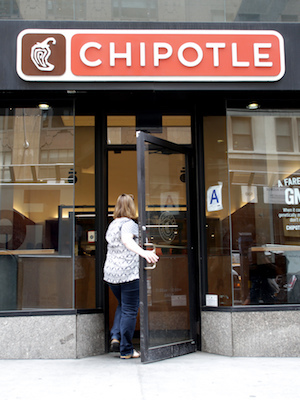LOS ANGELES (Legal Newsline) - In September, a woman filed charges against Chipotle Mexican Grill Inc. over allegations that the national restaurant chain violated the Fair Credit Reporting Act in its application documents.
The plaintiff, Lorena Mejia, claimed that the company’s consent and disclosure forms included provisions of false information, at-will provisions, a post-employment authorization and a reference to a provision that would allow for the company to conduct a background check on the applicant, all of which were allegedly not in compliance with the FCRA.
FCRA serves to uphold policies that prevent employers from obtaining private information and requires that they provide a written summary of rights, which Chipotle also reportedly neglected to include in the application.
David Anthony is an attorney at Troutman Sanders in Richmond, Va., with extensive experience in this type FCRA litigation. According to Anthony, FCRA cases are filed on a daily basis across the country, and the trend has been increasing steadily.
“Settlements in certain types of FCRA cases have been fairly substantial in the recent years. In addition, the use of background checks during the employment on boarding process is almost a given for most employment opportunities, so the FCRA impacts employers of all shapes and sizes,” Anthony said.
For example, one national employer, Whole Foods Market Group, was hit with a class action FCRA lawsuit that it subsequently settled last September for including a waiver and liability release in their FCRA disclosure form.
“The FCRA is a highly technical statute that has requirements that are deceptively simple. These specific and surprisingly technical requirements that must be followed in order for an employer to use a consumer report to make an employment decision make it easy for an employer to violate the FCRA if it does not have proper guidance on FCRA compliance,” Anthony said.
Along with the FCRA allegation, the plaintiff alleged that Chipotle violated the Investigative Reporting Agencies Act (ICRAA), the Consumer Credit Reporting Agencies Acts (CCRA) and California Business and Professions Code. These allegations cite similar charges and a complaint that there was no box to check for Mejia to receive a copy of the consumer report.
When the plaintiff filed her claim, she hoped to initiate a nationwide suit for all Chipotle applicants within the past two years who were subject to the same documents. However, Mejia voluntarily dismissed the case without prejudice on Oct. 27.
Though the case did not end in settlement, employers, Anthony said, can learn from cases like Mejia v. Chipotle Mexican Grill Inc. Background screenings are now an integral part of the hiring process for most companies, public or private, and the legal proceedings for violating the FCRA can be expensive and damaging to the company name, he said.
“Employers who are relying on background checks to screen their applicants and employees need to engage competent and experienced compliance counsel to review the processes that are used to conduct these background checks and the processes used when an employer uses a consumer report," he said.
"Courts continue to issue rulings on these technical FCRA requirements; therefore, complying with them is not a 'set it and forget it' process.
"Instead, employers may take proactive steps to ensure that their processes and forms remain current and legally compliant given the considerable exposure and litigation risk for non-compliance."
